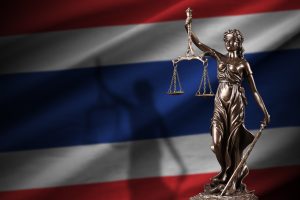Thailand’s former Prime Minister Thaksin Shinawatra yesterday took the stand in a Bangkok court to defend himself against royal defamation charges that threaten to curtail his influence in Thai politics.
The former leader has been charged with lese-majeste and computer crimes stemming from a 2015 interview that he gave with a South Korean newspaper, and has been barred from leaving Thailand without permission until the case is resolved.
Thaksin faces up to 15 years in prison if he is convicted under Thailand’s harsh lese-majeste law, which criminalizes criticisms of the king and the royal family.
Speaking to reporters after yesterday’s hearing, Thaksin’s lawyer Winyat Chatmontree said that the court would hand down its verdict on August 22 – two years to the day that Thaksin returned to Thailand from more than 15 years in self-exile. “We are confident that we will receive justice,” Winyat said, as per Reuters.
The case is just one of a series of legal challenges facing Thaksin and his daughter, Prime Minister Paetongtarn Shinawatra, whose government hangs by a thread after the leak in mid-June of an embarrassing phone call with Cambodia’s equally influential former leader, Hun Sen. During the call, which discussed the ongoing border dispute between the two nations, the Thai leader appeared to side with Hun Sen and accused a Thai general of being “completely aligned” with her political opponents.
On July 1, the same day that Thaksin’s trial opened in Bangkok, Paetongtarn was suspended by the Constitutional Court, pending an ethics probe into her conduct during the call with Hun Sen. The national anti-corruption body has also announced a similar investigation, and the Bhumjaithai party, which withdrew from Paetongtarn’s coalition after the call was leaked, has pledged to seek a vote of no-confidence in her government.
In addition to the current lese-majeste case, Thaksin also faces legal scrutiny for the circumstances surrounding his return to the country – in particular, that he faked an illness in order to avoid serving a single night of a lengthy corruption sentence in prison.
This flurry of legal cases marks an abrupt end to the truce between Thaksin and Thailand’s conservative political establishment, and a resumption of the political struggle between the two camps. For years, the establishment had sought to extirpate his influence, and pro-Thaksin governments were removed both via military coups (against Thaksin in 2006 and his sister Yingluck Shinawatra in 2014) and rulings by politically pliant courts.
However, after the May 2023 general election, which saw the opposition Move Forward Party (MFP) win a plurality of seats on a threateningly progressive platform, Thaksin’s Pheu Thai party agreed to form a coalition with conservative and military-backed parties in order to block the MFP from power. In exchange, Thaksin was allowed to return to Thailand, which he did on the same day in August 2023 that the new government was sworn in. An eight-year prison sentence was conveniently watered down, and Thaksin was granted parole in February of last year.
Despite the truce, many royalist opponents of Thaksin did not let go of their strong mistrust of the former leader, and many perceived that he overstepped the political boundaries of the deal by inserting himself so actively into the affairs of government. While he does not occupy any official position in government, Thaksin has been very active in government-adjacent roles, leading critics on both sides of Thai politics to accuse Paetongtarn (with some justice) of acting as his proxy. They have since seized on the border dispute with Cambodia, which has worsened since an armed clash between Thai and Cambodian soldiers on May 28, to attack the legitimacy of Paetongtarn’s government.
While the current cases will likely bring Paetongtarn’s term to an end, sooner or later, they also raise questions about the future prospects of the Shinawatra clan as a force in Thai politics, as Joshua Kurlantzick and Pavin Chachavalpongpun argued in an article in late June.
“Although the family has weathered numerous challenges in the past, changing party names at times, the convergence of internal fractures among its backers and sustained external pressures from powerful Thai actors now suggests the dynasty is done for,” they wrote.
































